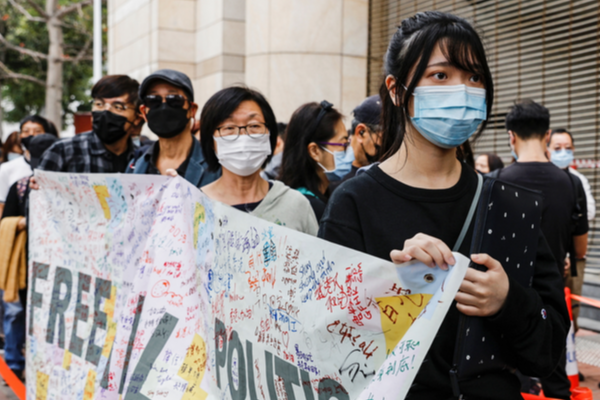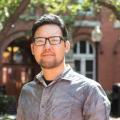“How deserted lies the city,
once so full of people!
How like a widow is she,
who once was great among the nations!
She who was queen among the provinces
has now become a slave.”
So begins the book of Lamentations. From the outside, the bustling global metropolis of Hong Kong hardly resembles this description penned by the prophet Jeremiah as he wept over the ruins of Jerusalem: Hong Kong’s skyscrapers still shine, and the financial capital that pulses in and out of its banks and firms continues to flow. And yet, for many of the city’s pro-democracy citizens, activists, and politicians, the spirit of Lamentations resonates. As Beijing tightens its grip, Hong Kong is undergoing a radical transformation that will align its sociopolitical realities with the rest of the Chinese mainland. For many Hong Kongers, this is the loss of their beloved homeland. And for Christians around the world, this unfolding tragedy challenges us to find ways to offer solidarity when Hong Kong’s churches are divided and nearly all of the movement's leaders have been arrested or sent into exile.
This past weekend, 47 pro-democracy leaders were charged and arrested for leading what were once perfectly legitimate campaigns to serve as city legislators. Today, as those arrested await their sentences, about 1,000 Hong Kongers are gathering outside the courthouse dressed in black to express their solidarity.
This most recent blow to the region’s democratic hopes comes just before the two-year anniversary of the anti-extradition law protests. In March 2019, Hong Kong’s decades-long precarity as a quasi-autonomous yet interdependent entity of the People’s Republic of China exploded back onto the world stage. What began as resistance to a specific legal proposal evolved into a city-wide movement against the Chinese central government’s increasingly authoritarian control. I was a witness to the city’s summer of protest, based there for my doctoral research on lived theology in the context of contemporary China. I am not a Hong Konger, but as a Chinese American Christian wrestling with questions of self, faith, and society across various national and cultural boundaries, the tensions of Hong Kong’s presence between empires beckon me.
Exile and imprisonment
Joshua Wong has been one of the most recognizable faces of Hong Kong’s democracy movement. In 2012, as a first-year high school student, Joshua and a cohort of youth led a successful city-wide campaign to reject Beijing-backed changes to a curriculum that emphasized patriotic loyalty to China. His leadership has since converged with several other pro-democracy groups hoping to reform Hong Kong’s political system.
Joshua publicly identifies as a Christian. I had the opportunity to ask him about how his faith informed his activism during a speech he gave at Georgetown University in the fall of 2016. At the time, perhaps mindful of the complex optics of faith and politics, he responded diplomatically. He said his faith was very important to him and inspired his actions, but that he was equally driven by his love for his country and the rule of law — a coalition of multiple values and beliefs. He emphasized that the principles he was fighting for — democracy and human rights — are resonant for all of humanity.
In 2021, however, attaining these principles appears less and less tenable. This past November, I wrote a brief primer on the coming confrontations the Hong Kong church faced as Beijing’s National Security Law (NSL) was enforced. In the months that have followed, fears of the NSL’s effect on civil society have proven disturbingly accurate: Dozens have been arrested for allegedly undermining Hong Kong’s security, including Joshua and many of his associates. Hundreds more have fled the region to seek asylum in other parts of the world. Up to half a million people are predicted to leave Hong Kong for the United Kingdom in the next year.
Under these difficult conditions, Joshua’s faith has taken a more public turn. Early in August 2020, he tweeted the entirety of Psalm 23. On Nov. 22, in a message posted before his court hearing, Joshua cited scripture again: “‘We rejoice in our sufferings,’ Romans 5:3-4 reads, ‘knowing that suffering produces endurance, and endurance produces character, and character produces hope.’ Once sown, seeds will one day sprout. Weary and distraught as some of you might feel, please have each other’s backs. Cages may lock up our bodies, but never our unwavering souls.” His words signaled a personal dependence on his spiritual roots as he braced for what must have felt inevitable: On Dec. 2, 2020, just months after his college graduation, Joshua was sentenced to 13 months in prison.
Joshua’s fate is one step in a procession of exiles and imprisonments taking place across Hong Kong and spilling out into the rest of the world. Hong Kong’s Catholics are beginning to feel the tremors of state oversight, including pressure on the Vatican to nominate a pro-Beijing bishop. Protestant congregations are also under similar scrutiny. In December, Good Neighbor North District Church, a non-denominational evangelical congregation, was investigated for alleged money laundering, its bank accounts frozen and some staff members arrested. The church’s pastor, Roy Chan, believes the move is in retaliation for his leadership of “Protect the Children,” a group of citizen peacemakers who protected youth from police brutality during the protests. Pastor Chan and his family are currently exiled in Great Britain.
As these changes accelerate, Hong Kong’s churches have struggled to find a cohesive theological and pastoral response; many congregational leaders are divided between pro- and anti-establishment views, while others have tried to remain neutral, admonishing parishioners to stay focused on spiritual salvation free of political complexities. Each group wields scripture and theology to further their own vision of God’s reign, and in doing so, often denounce their brothers and sisters. Some blame Hong Kong’s current situation squarely on the radical actions taken by protesters, rebuking them for forcing Beijing’s heavy hand. Others lay responsibility on Hong Kong’s Beijing-aligned government and policing. These church divisions are as visible at the highest levels of Hong Kong society as they are in the pews: Carrie Lam, the region’s Beijing-approved chief executive, and Jimmy Lai, owner of the vocal pro-democracy media company, Apple Daily, are both practicing Catholics.
A time to weep
How shall the body of Christ, so divided, respond to the region’s bleeding wounds? The entire arc of the Hebrew Bible can be read as one long, multi-generational liturgy of struggle with exile and belonging, punctuated by prophetic warnings and God’s uncomfortable expectations to somehow render both justice and mercy. Psalms and prophets alike groan and wonder between exile and restoration, between wandering the desert and taking hold of or returning to a promised land. The New Testament gospel itself sits between death and resurrection, between Christ’s salvific act in an already-but-not-yet church awaiting consummation.
This biblical reality is unsatisfying, yet increasingly pertinent to Hong Kong’s Christians and all followers of Christ who wait and wonder amid persistent insecurity. The temptation is to just fight harder, not to mourn. Our dominant culture abhors weakness: It cannot be publicly shown if victory is to be attained. But for Christians who engage in prophetic ministry, Walter Brueggemann writes in The Prophetic Imagination, our task “is to nurture, nourish, and evoke a consciousness and perception alternative to the consciousness and perception of the dominant culture around us.” Lament is not weakness or failure; lament provides emotional avenues to spiritual renewal.
Joshua Wong was not the only young activist sentenced on Dec. 2. Standing beside him was Agnes Chow, a young Catholic, similarly known around the world for her leadership and courage. Whereas Joshua stoically accepted his fate, Agnes wept. At the time of her sentencing, she was hours shy of her 24th birthday, a milestone she would have to spend alone in prison. Today, we need Agnes’s tears as much as we need Joshua’s words of strength — both spirit-filled calls for liberation and collective lament that creates space to hear each other’s pain.
When a member of the body of Christ weeps, those tears are not shed alone. Hong Kong’s divided churches join Chinese house churches on the mainland who have long lived under the circumstances Hong Kong fears and yet their faith continues, even as state-registered churches continue to work under the central government’s direct oversight. Black churches in the U.S. continue to preach against systemic racism while many white churches down the street continue to deny racism’s legacy in the present. Palestinian Christians continue to worship each week, refusing to be ignored by some Christians who see divine backing in the state of Israel’s policies. Simultaneously mourning and working for justice while struggling with our divisions is the substance of faith for many of the world’s Christians.
“The cross is the assurance that effective prophetic criticism is done not by an outsider but always by one who must embrace the grief, enter into the death, and know the pain of the criticized one,” Brueggemann continues. Lament is vital to the prophetic imagination precisely because it embodies the gospel itself: a recognition that only in death can there also be resurrection.
For all who have dared to dream and organize for a democratic Hong Kong, the city feels like it is on the brink of death. In lament, we connect these feelings of anger, sadness, and loss with the body of Christ, a body familiar with such scars. In solidarity with Hong Kong and all those who continue to light their candles amidst overwhelming darkness, Christians all over the world can echo the words Jeremiah wrote so many years ago, praying in hope and confusion:
“You, Lord, reign forever;
your throne endures from generation to generation.
Why do you always forget us?
Why do you forsake us so long?
Restore us to yourself, Lord, that we may return;
renew our days as of old
unless you have utterly rejected us
and are angry with us beyond measure” (Lamentations 5:19-22).
This article was made possible in part with support from Sacred Writes, a Henry Luce Foundation-funded project hosted by Northeastern University that promotes public scholarship on religion.
Editor's note: This article was updated on March 3, 2021 to clarify that Good Neighbor North District Christian Church was investigated for alleged money laundering, but not closed.
Got something to say about what you're reading? We value your feedback!






